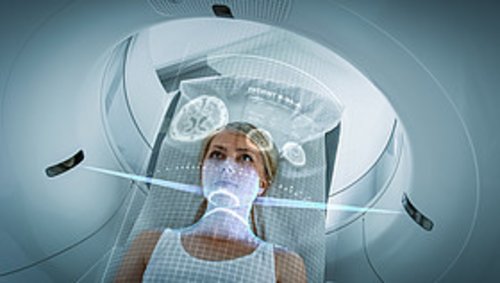What happens in the brain during Parkinson’s disease? Is the heart muscle enlarged? How much blood is ejected per heartbeat?
Questions like these can be effectively answered using a magnetic resonance imaging (MRI) scanner. And these devices can be made significantly more powerful with the help of artificial intelligence (AI). For instance, AI can produce razor-sharp images of a beating heart even within the short recording time between two breaths. AI can also speed up doctors’ work: Previously, to examine irregularities in heart chambers and heart function, a doctor would have to manually mark different areas (e.g., atria, ventricles, and myocardium) while also accounting for the phase of the heartbeat. This process could take up valuable time – or be completed by AI at the push of a button in seconds.
“Doctors need AI solutions they can trust, ideally proven through objective evaluation processes,” says Maik Liebl. The PTB scientist will present a demonstrator at the Hannover Messe (April 22–26) that can evaluate AI algorithms for medical applications. “With our new testing service, we will enable manufacturers to have their algorithms reviewed by us as an impartial authority. They can then post the results on their websites and use them to advertise the quality standards their AI algorithms meet,” explains Liebl.
In essence, PTB offers the same type of service it has long provided in the area of calibrations. As the top authority for the most precise measurements, PTB is firmly embedded in the quality infrastructure system – the structured approach that ensures reliable measurements and high-quality products in Germany. But what about the emerging field of AI-supported measurements? “Actually, the answer is clear,” says Hans Rabus, a PTB AI expert. “We are legally tasked with verifying measuring devices. And since the relevant laws are formulated to be very technology-neutral, PTB is obliged to reassess its role with every new technological development. That’s exactly what we’ve done with AI in medicine. The conclusion: PTB has an important role to play here.”
This concerns a highly relevant and somewhat controversial field. The Global Risks Report of the World Economic Forum, published in January 2024, lists AI as one of the biggest risks to the global economy (though this often refers to areas outside of medicine). Additionally, the new EU directive, the EU AI Act, is the world’s first comprehensive legislative package for artificial intelligence. Adopted unanimously by EU member states on February 2, it still needs approval from the European Parliament and the Council of the European Union. The directive classifies AI in medicine as a high-risk domain, subject to strict regulations. Meanwhile, the German government has announced its ambition to elevate AI research and applications in Germany and Europe to a globally leading level (see the German government’s AI strategy, 2020). This calls for decisive action, including efforts to strengthen the still-fragile trust in artificial intelligence.
This is precisely the goal of PTB with its demonstrator for an AI service, which it will showcase at the Hannover Messe to all interested parties. The web service will be offered via the well-established TraCIM portal (Traceability for computationally-intensive metrology), developed as part of a European project and already successfully used in other fields for years. For example, PTB evaluates analysis algorithms for industry, such as in coordinate metrology, and has largely digitized its services. “We just needed to expand it for the significantly more complex case of evaluating AI algorithms,” explains Maik Liebl. His work is part of the pilot project Artificial Intelligence in Medicine under the QI-Digital initiative.
Liebl and his team have already tested their system using publicly available data: They downloaded MRI data from one of the many competitions known as “Grand Challenges.” These include images of right and left heart chambers and the myocardium, along with assessments made by medical experts. The next step is to establish a “golden dataset” or gold standard – essentially, something akin to a reference object with known properties, against which measuring devices can be calibrated. For this, they need clinical partners and stakeholders from industry and politics. Liebl looks forward to lively discussions at the trade fair booth to advance this crucial topic. “After all, we’re all in the same boat. The EU AI Act compels us to act quickly. The goal is to develop this system into a practical solution through a collaborative project. Ultimately, we can only move forward together.”

